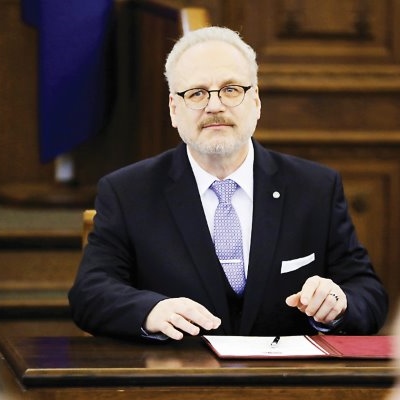click to dowload our latest edition
CLICK HERE TO SUBSCRIBE TO OUR NEWSLETTER


Published
5 years agoon
By
adminJORDAN MOSHE
Taking up this position makes Levits the second Jewish head of state outside of Israel. The first is Ukrainian president Volodymyr Zelensky, a 41-year-old Jewish comic actor, who took up office in May this year.
Levits is a lawyer and political scientist. He served as a judge in the European Court of Justice, and co-authored his country’s declaration of independence.
“As I take my oath of the president of Latvia in the 101st year of the existence of the Republic of Latvia, I’m aware that I have been passed the baton from my predecessors, all who have built and shaped the character and significance of this post in various circumstances of our complicated history,” said Levits in his inaugural speech.
Levits, 64, made the solemn vow on 8 July, when he officially became Latvian president. He replaced Raimonds Vējonis, who didn’t seek a second term.
His appointment comes just a few weeks after that of Zelensky, which resulted in Ukraine becoming the only country (outside of Israel) to have both a Jewish president and prime minister. Prime Minister Volodymyr Groysman was elected prime minister in 2016, although he announced his resignation in protest against the new president’s decision to dissolve parliament.
Levits was born in Riga, Latvia, during the Soviet occupation to engineer Jonass Levits and the Latvian poetess Ingeborga (also known by her pen name, Aija Zemzare). Both were anti-Soviet dissidents who were expelled from the Soviet Union in 1972 as the KGB (Russian committee for state security) viewed them as a threat to the communist regime.
The family settled in West Germany with Ingeborga’s relatives, returning to Latvia in 1990 when the country regained its independence. Before their return, Levits obtained law and political science degrees in Germany, equipping himself to enter politics upon his return to Latvia.
His involvement in the political sphere began in the late 1980s, when Levits became a member of the Latvian People’s Front Council and a member of the Latvian Civil Congress, established in 1989. In May 1991, he co-authored Latvia’s declaration of independence, and participated in the development of the preamble to the country’s constitution.
In 1993, he was elected fifth parliamentary deputy from the list of the conservative-liberal Latvijas Ceļš party, thereafter serving as ambassador of Latvia to Austria, Switzerland, and Hungary.
He went on to serve as Latvia’s justice minister, be elected Latvia’s representative in the European Court for Human Rights, and became a judge in the European Court of Justice. His achievements resulted in him in 2018 being named “European man of the year in Latvia” by the European Movement.
Levits’ rise to the presidency began with his being named presidential candidate by the National Alliance party in both 2011 and 2015, coming second in votes in both rounds to Vējonis.
Levits was again identified as a strong candidate for the presidency in early 2019, and in April, the parties of the ruling coalition announced that they would support his candidacy. Parliament elected him on 29 May, and Levits was subsequently inaugurated.
The Latvian presidency is primarily a ceremonial post, but grants the president the status of commander-in-chief of the armed forces, and the power to appoint the prime minister and ambassadors. The office of prime minister has been held by Latvian linguist, businessman, and politician, Arturs Krišjānis Kariņš, since January this year.
Levits has committed himself to reducing inequality and making Latvia a modern country. He has reportedly taken to his new role with determination, working to address the country’s public media crisis, and keeping himself apprised of development plans for the country’s armed forces and potential military threats.
He also recently met Lithuania’s new president, Gitanas Nausėda, on a visit to Riga to reaffirm good neighbourly relations between the two nations. Although he has apparently spoken little of his Jewishness in public, the Jewish Community of Lithuania portal states that Levits has stressed that Latvia should follow Lithuania’s example in supporting Jewish culture and history issues.
Levits has urged the Latvian people to work for the country’s benefit, saying in his inaugural speech, “We have inherited our country from previous generations, which won and shaped it. Our task is hand over our country to next generations better than we inherited it. One’s own country must be continuously adjusted, renewed, and modernised so that it will be sustainable. That’s our duty to history.”
